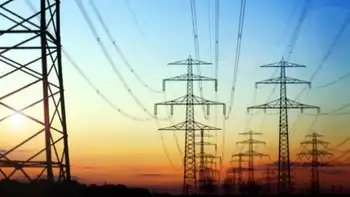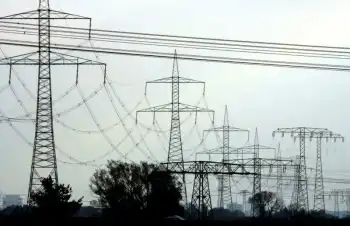Green power law draws wind parks to New Hampshire
By Union Leader
Arc Flash Training CSA Z462 - Electrical Safety Essentials
Our customized live online or in‑person group training can be delivered to your staff at your location.

- Live Online
- 6 hours Instructor-led
- Group Training Available
Like 29 other states and the District of Columbia, New Hampshire is offering tradeable credits for renewable power through the state's new Renewable Portfolio Standard, known as RPS.
"Noble would not be building if they didn't have this scheme — and I use scheme in the positive sense — in place," Martin Murray, spokesman for Public Service Company of New Hampshire, said of the parent company for the Coos project.
"Just from the sale of energy alone, (the Coos project) would not have been able to be built because the costs are too high. But with this, (the law) they have two products, the energy itself and the credits," Murray explained.
The 2007 law requires utilities to buy certain percentages of power from renewable sources; Gov. John Lynch's goal is to have 25 percent of the electricity used in New Hampshire come from renewable resources by 2025.
The Granite Reliable Power Project received a state certificate July 15 to build a 99-megawatt wind park. Using a series of 33 towers from Dixville Peak south along Mount Kelsey in the Phillips Brook area, it is expected to produce enough emissions-free electricity to power 40,000 homes a year.
On its Web site, Noble said it will spend $275 million to build the wind park here because of the Renewable Portfolio Standard.
In 2005, about 10 percent of the state's power came from renewable resources, but that is now increasing.
But it will cost consumers a pretty penny.
Murray acknowledged it costs more to buy the renewable power.
"Fossil fuel is comparatively cheap," he said.
On June 19, Iberdrola Renewables dedicated the state's first commercial wind operation in Lempster.
Paul Copleman, communications manager for Iberdrola Renewables, said RPS is "a positive factor" when determining where to locate, but ultimately wind and access to transmission are the primary drivers.
PSNH buys the wind and RPS credits or "RECs" and it also sells the power to New Hampshire Electric Coop.
Copleman said the company began plans for its 24 megawatt park before the state had enacted its RPS.
"It is an added positive factor because it provides an additional market," he said of the credits.
Attending the Lempster dedication the governor said, "We must push ahead in pursuit of a new energy future that will help to protect our environment, create new jobs and strengthen our energy independence."
The state's Site Evaluation Committee voted unanimously to issue a certificate with conditions for the 99-megawatt Granite Reliable Power within one year of its application.
It is still subject to federal permitting, and would boost New Hampshire's wind production to 125 megawatts by 2011.
PSNH's Murray said the project simply would not have come here were it not for RPS credits.
One reason PSNH decided to convert a fossil fuel burning boiler at Schiller Station into a wood-chip burning plant was to get into the credit program to help pay down the debt on the project. The company also has new solar panels on its building in Manchester, which it can also get credits for.
The Northern Wood Project has sold its renewable energy credits to Massachusetts, while PSNH can also use it to make electricity for its customers. The Northern Wood Power boiler began operations in December 2006.
To date, it has produced about 800,000 megawatt hours of energy, thereby producing 800,000 credits, known as RECs.
"For the most part, we have sold these RECs to energy suppliers who need them, and used the income to pay down the capital costs of the Northern Wood Power project," said Murray.
The certificates are sold to utilities that did not buy the actual renewable power, but a certificate verifying that the renewable power was produced.
Wood chip plants across the state have reinvested in their equipment to be certified as REC producers; PSNH invested in a new turbine at Smith Hydro in Berlin for that same reason.
"The act establishing minimum renewable standards for energy portfolios recognized that such projects were in the long term beneficial to the state," Murray said.











